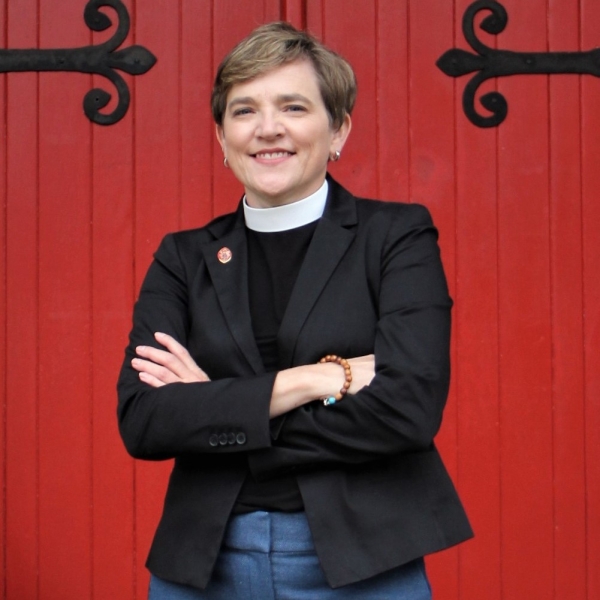May 8, 2022

Have you ever been on a journey in the woods and realized you needed a guide? Have you ever been on a tour with a really amazing guide and felt changed by the experience? My friend Kelly was telling me about her experiences as a tour guide in Prague, and I was astounded by how similar it was to my daily life and work, both as a lay minister and as a cleric. Since then, when in a light-hearted situation and asked to describe my job, I say that ‘I am a tour guide for a trip that not everybody knows that they are on’. Tour guides, teachers, camp counselors - are all shepherds. When describing part of a clergy life we talk about the pastoral, which by the dictionary definition is ‘expressive of the life of shepherds’. The need for a guide, a shepherd, isn’t about life inside the fences but is needed for where Jesus is and leads us, out across the fences of our comforts and assumptions. We need shepherds in the wilderness and the borderlands.
In our lesson from the Acts of the Apostles today, a whole text about the experience of the church in the borderlands, there are shepherds. Tabitha is a shepherd. Her description as a devotee of Jesus and an activist in his way, the details of her life and ministry: generosity of heart and soul and time. She was a shepherd.
Peter, St. Peter, is a shepherd. Not because someone will someday give him a crozier (which I don’t think would have happened historically, but you get the point). He is a shepherd because of his ability and willingness to help someone in need.
Our wondering about Jesus as the Good Shepherd is as powerful as it is complicated. It has, since the earliest days of the primordial church, been fed by seeming opposites: the Alpha-Omega creative Word of God, and,
the mothering wanderer picking the fleas off the sheep. The shepherd imagery itself is of dissimilar meanings.
Shepherds had the essential job of delivering precious commodities, yet were regarded as dirty edge-dwelling hucksters. To complicate the teaching even further, the ideal shepherd was (and is) touted as a vision of ideal governance, and also, as an icon of God’s merciful presence and devotion. Furthermore, since we are examining the Good Shepherd imagery, good can be an overused word, too often meaning nice or inoffensive - which is a distorted likeness to our savior. It may be useful to consider what a good shepherd is not:
saccharine, willfully blind, decadent, silent in the face of evil, out for themselves alone. I wonder who have been your good shepherds, surprise tour guides, religious or not? And what are the wolves that you adhere to that are not of good shepherding - forces that demean, exhaust, lie, and hoard?
Episcopal is a word that even if people cannot pronounce it, they might have some ideas about it. As a professional and lifelong Episcopalian, I have heard some fascinating mispronunciations and a wide array of colloquial understanding of what it means. Ideas that have come to me in comments such as:
advanced placement Christianness, to ‘you’re the not uptight church’ to ‘this wasn’t as stuffy as I expected.’
All those dissimilar observations can be true and not true. Episcopal however means shepherded, because it means being a Bishoped church, and Bishop is meant in the usage of being a shepherd. So that when we say Episcopal bishop we are actually saying shepherd-y shepherd. Getting to the root of Episcopal means
we are a shepherd-ed community of Christian discipleship. There are broad creative fields to roam through - ancient and contemporary -but also a safe homestead with a guardian. It means that we are never alone
in networks of mutually dependent and supportive ministries across the region and world, and through the generations right back to Peter.
We also embody a tradition of the shepherded way of life through something that might seem quite far from a shepherd: the Book of Common Prayer traditions. Not stone tablets, but an expanding and evolving field for the sheep to live and grow and be restored to life in. Don’t think you know where to start to pray - here is a shepherd to give you the words you needed. Feel you can make it up all by yourself - here is a flexible fence to shape you. Episcopal means shepherded - always a guide, always a home base, always a network of tour guides on duty.
Jesus is the Good Shepherd. My mentor, my priestly shepherd, used to say bishops are the shepherds, and priests and deacons are the sheepdogs. I think he is right, but I also feel that as people who claim Jesus as our guide, we are all also little ‘s’ shepherds with Tabitha and Peter. For we are all in need, and we are all called, whether we think we are prepared or not to be a shepherd for strangers and neighbors. What we do here week by week, whether with sacraments or community prayer, is shepherd alongside Jesus in the borderlands. We make our way through the ever-present challenge of how to live and lessen the suffering, in a world full of forces both trying to do just that and doing anything but that. Good shepherding is rarely about simple answers, but it is always about a reconciling wholehearted presence. Even though we walk through the wilderness, the holy grubby tour guide is with us, the Good Shepherd who does not leave us where he finds us. Amen.